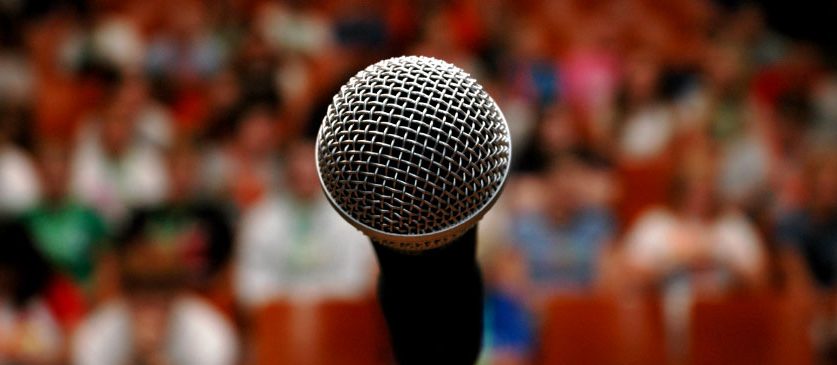 Nearly every Monday evening, for three years, I’d be at the same place – the Apopka Foliage Toastmasters club meeting. I originally joined Toastmasters to sharpen my public speaking skills as a spokesperson and public relations professional. Although I’ve never had a fear of public speaking, I knew my communication skills could be honed; practicing would be the most effective way to improve.
Nearly every Monday evening, for three years, I’d be at the same place – the Apopka Foliage Toastmasters club meeting. I originally joined Toastmasters to sharpen my public speaking skills as a spokesperson and public relations professional. Although I’ve never had a fear of public speaking, I knew my communication skills could be honed; practicing would be the most effective way to improve.
“Practice put brains in your muscles.” -Sam Snead
With over 15,000 clubs worldwide, Toastmasters International‘s mission is to “empower individuals to become more effective communicators and leaders.” Clubs provide a self-paced, supportive atmosphere for its members to practice their public speaking skills, while offering opportunities for leadership within the organization. I joined Toastmasters with the primary goal of becoming a stronger communicator in a professional setting.
Shortly after joining, however, I discovered the benefits went beyond the office.
As a Toastmaster, I’ve learned that effective communication is vital, in both our professional and personal lives. The ability to speak clearly, succinctly and poignantly is a skill that will positively impact every area of lives. To varying degrees, people judge us by the way we speak.
Whether we’re delivering a presentation to a client, engaging in a discussion with a loved one, or serving as a mediator between two friends with clashing viewpoints, strong communication skills are beneficial. However, because most of us aren’t born natural orators, public speaking and communication skills, in general, must be practiced – consistently.
“Knowledge is of no value unless you put it into practice.” -Anton Chekhov
Organizations like Toastmasters provide an ideal atmosphere to practice your communication skills – at your own pace.
Here are a few tactics Toastmasters teaches to improve public speaking:
1. Speak slower. Because much of our credibility is based upon how we sound, it’s important to project confidence and assurance. I learned, through Toastmasters, that speaking too fast tells your audience that you don’t think what you have to say has much value, and thus doesn’t deserve much time. If you have something to say, say it! Say it clearly, confidently and at a pace where everyone in the audience can hear and understand.
2. Own your space. One of the components of the Toastmaster program is using your body to enhance your speech or to help get your point across. Additionally, the use of space is one way we make a statement about our confidence when we’re speaking in front of a group. Through Toastmasters, I learned to ‘own my space,’ whether I’m speaking professionally, or in a personal setting. Owning my space means using the entire space available to me, incorporating gestures where appropriate and checking my posture to ensure I’m projecting confidence and self-assurance.
3. Improve eye contact. Through Toastmasters, I’ve learned that your audience will connect with someone who they’ve been endeared to. Effective eye contact is the best way to connect with those you’re speaking with, thus building endearment. Eye contact also improves the ability to engage in ‘active listening’. Whether I’m presenting a report to a colleague, or engaging in a heated discussion with a loved one, eye contact ensures that I’m allowing others to see my sincerity, confidence and knowledge – and in turn, see these things in the other person.
Whether through Toastmasters or by practicing on your own, I encourage you to make becoming a more effective public speaker a top goal this year.
What tactics have you incorporated to improve your public speaking or presentation skills?
“We are what we repeatedly do. Excellence, then, is not an act but a habit.” -Aristotle
Kelda Senior is a GovLoop Featured Contributor. She is a business development and accredited public relations professional from Florida. For the past 10 years, Kelda has served as a communications and community outreach specialist in local, state and federal government, with an emphasis on the transportation sector since 2012. Kelda is the owner of Senior Communications LLC, a boutique public relations firm focused on helping emerging brands cultivate their message and move their audiences to action. Kelda holds a B.A. in journalism and a master of public administration – both from the University of Central Florida in Orlando. You can read her posts here.





That speak slower point got to me! At first, I thought I don’t like speaking slow but then read how speaking fast shows that we don’t value or others may not value what we say, or are afraid of that happening. I’m guilty of that. I tend to speak like someone may lose interest if I don’t get it out fast enough but I shouldn’t communicate that way! Thanks,
James: I can totally relate to feeling like people may lose interest. Mind over matter, though – and practice is key!